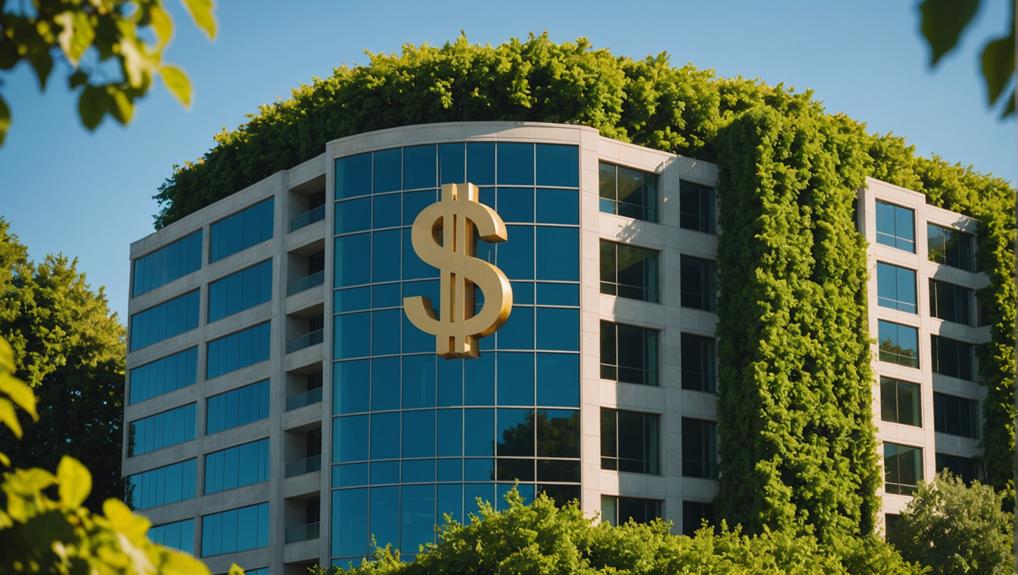Investing in commercial real estate extends far beyond simply owning property; it offers a multitude of significant advantages that can fortify a financial portfolio. These advantages include the potential for higher income and consistent cash flow, leveraging tax benefits, and the appreciation of property values.
The opportunities are vast and multifaceted. Diversifying investments, hedging against inflation, and cultivating relationships with professional tenants further enhance security and growth. By examining these ten key benefits, it's clear that commercial real estate is a strategic asset in financial planning.
What truly sets it apart is its unique combination of stability, growth potential, and diversification.
Key Insights
- Higher income potential with double-digit returns and steady cash flow.
- Long-term appreciation through property value growth and strategic upgrades.
- Tax advantages, including depreciation benefits and deductible expenses.
- Portfolio diversification with lower market correlation and diverse property types.
- Inflation hedge with rental income adjustments and returns that outpace inflation.
Higher Income Potential

Investing in commercial real estate offers significantly higher income potential compared to residential properties, often yielding double-digit returns. This lucrative potential attracts accredited investors and institutional investors who are willing to commit significant initial capital.
The steady cash flow generated from higher rental income, combined with longer lease terms and professional relationships with commercial tenants, ensures consistent revenue. Commercial properties also adhere to better maintenance standards, attracting high-quality tenants and maintaining property value.
These factors collectively contribute to a stable and reliable income stream, even during market volatility. The substantial initial capital required is justified by the promising returns, making commercial real estate an appealing investment for those seeking higher income potential.
Long-Term Appreciation

Commercial real estate has a well-documented history of long-term appreciation, providing investors with opportunities for considerable capital gains. Factors such as strategic property upgrades, prime locations, and market demand drive this appreciation. Over time, property values can rise faster than inflation, protecting against economic uncertainties and helping to preserve wealth.
Investors often see substantial returns, particularly in high-demand areas, leading to significant wealth accumulation. The table below outlines key factors that contribute to long-term property appreciation:
| Vital Factors | Impact on Property Value |
|---|---|
| Prime Location | Accelerated appreciation, higher ROI |
| Market Demand | Increased value, capital gains |
| Strategic Upgrades | Enhanced property worth |
| Inflation Hedge | Protection of wealth accumulation |
This data underscores the importance of focusing on these factors when investing in commercial real estate.
Tax Advantages

Investors in commercial real estate can benefit from various tax advantages that significantly enhance the overall returns on their investments.
Depreciation benefits allow investors to deduct a portion of the property's value annually, accounting for wear and tear, which offers substantial tax incentives over time. In addition, they can deduct property repairs, maintenance costs, and property management expenses.
Mortgage interest on commercial properties is also deductible, providing significant tax savings, especially for higher interest loans. Travel costs and 50% of food expenses incurred during property visits are eligible for deduction.
Losses on commercial real estate investments can be tax-deductible, depending on specific classifications, further enriching the tax advantages for investors.
Portfolio Diversification

Investing in commercial real estate significantly broadens a portfolio by offering lower market correlation compared to traditional stocks and bonds. This noncorrelation acts as a risk mitigation strategy, stabilizing a portfolio during economic uncertainties.
Including diverse types of commercial properties further reduces overall investment risk and optimizes potential returns.
Lower Market Correlation
Incorporating business real estate into your investment strategy can achieve lower market correlation, thereby enhancing portfolio variation. Unlike traditional investments such as stocks and bonds, business real estate is influenced by different market factors.
This lower market correlation means that the value and returns from business properties are less likely to be directly impacted by stock market volatility. Consequently, diversifying your portfolio with business real estate can provide stability and reduce overall risk exposure to market fluctuations.
The insulation against stock market volatility makes business real estate a valuable addition, ensuring that your investment portfolio remains resilient even during turbulent economic times.
Risk Mitigation Strategies
Investing in a diverse range of commercial real estate assets can effectively mitigate risk by protecting your portfolio from market volatility. Incorporating different property types such as office buildings, retail spaces, and industrial properties enhances portfolio stability.
A strategic tenant mix across these properties diversifies income sources, reducing reliance on any single market segment. Implementing well-planned exit strategies ensures efficient asset liquidation when necessary, adding another layer of risk management.
This diversified approach offers a hedge against economic uncertainties, safeguarding against potential losses during downturns and stabilizing overall returns. Diversifying with commercial properties simplifies portfolio risk management, making it a prudent investment strategy.
Inflation Hedge

Commercial real estate investment effectively hedges against inflation by safeguarding investors' purchasing power. This is achieved by allowing rental income to rise in tandem with economic growth, thereby counteracting inflation's diminishing effects.
Lease agreements often include escalation clauses, ensuring rental income adjusts upward over time and enhancing net operating income (NOI. Historical data indicate that commercial real estate returns typically outpace inflation, offering a reliable buffer.
Properties secured by floating-rate debt can benefit from higher interest payments during inflationary periods. The capitalization rate (cap rate) also plays a crucial role in determining property value and potential returns, solidifying commercial real estate as a strong inflation hedge.
Stable Cash Flow

Securing stable cash flow is a primary advantage of commercial real estate investments, driven by rental income from long-term leases. Tenants often commit to extended lease periods, providing reliable revenue streams for investors.
Conducting a thorough cash flow analysis allows investors to project net operating income (NOI), ensuring that operating expenses and debt service are covered. The capitalization rate (cap rate) plays a pivotal role in assessing the profitability of these investments, reflecting the potential return on investment.
Even during economic downturns, commercial properties can maintain consistent cash flow, offering financial stability. Expanding into commercial real estate enriches an investor's portfolio by adding multiple income streams, thus increasing overall financial resilience.
Professional Tenant Relationships

Maintaining professional relationships with commercial tenants is crucial for stable and prosperous property operations. Building trust and fostering open communication significantly improve tenant stability, leading to longer lease terms and timely rent payments.
These relationships also enable efficient conflict resolution, ensuring a positive atmosphere and smooth property management.
Building Trust and Communication
Building trust and maintaining open lines of communication with tenants are essential in the commercial real estate sector. Strong tenant relationships lead to longer lease terms and stable income streams. Trust and effective communication promote timely rent payments and diligent property care.
Promptly addressing tenant concerns enhances satisfaction and retention rates. These positive relationships can generate referrals, positive reviews, and bolster a good reputation in the market. Prioritizing trust and open communication reduces turnover and lowers vacancy rates, increasing property value over time.
Investing in tenant relationships is crucial for long-term success in commercial real estate.
Enhanced Tenant Stability
Developing professional relationships with commercial tenants significantly improves tenant stability, leading to long-term leases and predictable rental income. Engaged tenants are more likely to maintain their leased spaces, reducing turnover and vacancy rates.
Committed to their business operations, these tenants tend to make timely rent payments and uphold property standards, ensuring consistent rental income. Strong relationships also foster an environment where tenants help lower maintenance costs and improve property upkeep.
Enhanced tenant stability in commercial real estate results in steady cash flow and minimized leasing risks. This stability benefits property owners financially and contributes to the overall sustainability of the commercial property.
Efficient Conflict Resolution
Clear communication and mutual understanding in professional tenant relationships are crucial for resolving conflicts efficiently in commercial real estate. Establishing professional boundaries and expectations helps prevent misunderstandings in property management.
Prompt and professional issue resolution enhances tenant satisfaction, fostering long-term relationships. Lease agreements and policies serve as foundational tools to address potential conflicts, ensuring smooth operations.
Effective conflict resolution strategies maintain positive tenant relationships and reduce turnover rates. This proactive approach significantly contributes to the overall success of commercial real estate investments, emphasizing diligent property management practices.
Efficient conflict resolution, therefore, reinforces the stability and profitability of commercial real estate initiatives.
Leverage Opportunities

Leverage in commercial real estate allows investors to significantly enhance their purchasing power through strategic borrowing. By using debt, investors can acquire larger or more properties than possible with equity alone.
Key metrics such as the loan-to-value ratio (LTV) and debt service coverage ratio (DSCR) are critical in assessing financial viability. The LTV ratio determines the amount of debt relative to the property's value, while the DSCR measures the property's ability to cover debt payments with its income.
Rental income can offset debt payments over time, increasing the property's equity. Leveraging can magnify both gains and losses, underscoring the need for careful financial planning in commercial real estate investments.
Tangible Asset Ownership

Owning tangible assets in commercial real estate allows investors to physically control and manage their properties, fostering a sense of security and stability.
This form of ownership not only maintains the inherent value of the investment but also instills pride in the investors.
The ability to renovate and improve these properties further enhances their market appeal and long-term worth.
Physical Property Control
Owning commercial real estate allows investors to exercise direct control over their property, facilitating strategic management and improvement decisions. This control enables investors to enhance the value of their assets by making targeted upgrades and modifications.
Unlike intangible investments, commercial real estate offers a unique opportunity for hands-on management, directly impacting the property's performance and long-term profitability. Tangible asset ownership allows investors to actively monitor and maintain their properties, ensuring they remain viable and lucrative.
Direct influence over their investment enables owners to implement value improvement strategies, such as renovations or reconfigurations, attracting higher-quality tenants and increasing rental income, thereby maximizing the overall return on investment.
Real Asset Security
Investing in commercial real estate offers the security of tangible asset ownership. This enables investors to physically possess and manage their property. This real asset security is appealing because commercial properties naturally retain value over time.
Unlike intangible assets, tangible asset ownership allows investors to see and feel their investment, reinforcing its stability. Regardless of property value fluctuations, the underlying tangible asset remains valuable and can be restructured or remodeled to enhance its worth.
This stability and potential for value addition make commercial real estate a reliable component of an investment portfolio. The intrinsic value and real asset security of owning commercial real estate provide investors a dependable foundation for wealth accumulation.
Pride in Ownership
Investors can take immense satisfaction in ownership when they acquire commercial real estate, as it offers a tangible asset that can be physically seen and showcased. Unlike stocks or bonds, commercial properties allow investors to point out their assets, providing a unique sense of security and accomplishment.
Real estate syndication and joint ventures enable investors to pool resources to acquire high-value properties, enhancing the pride associated with tangible assets. The inherent value of commercial real estate remains resilient over time, even in the face of market fluctuations.
Additionally, the potential for restructuring and remodeling can significantly boost the property's value and appeal, contributing to a lasting sense of ownership and investment permanence.
Potential for Business Expansion

Commercial real estate provides businesses with strategic opportunities to expand their operations and reach a wider customer base. Investors such as hedge funds, high-net-worth individuals, and real estate investment trusts (REITs) see significant growth potential in these investments.
Commercial properties offer the essential space and infrastructure to enhance productivity and accommodate scalability. Securing prime locations can greatly increase brand visibility and attract more customers. Ownership of commercial properties allows businesses to better manage operating costs and align growth strategies with long-term objectives.
This autonomy supports future expansion plans, enabling businesses to adapt and thrive in a competitive market.
Conclusion
Investing in commercial real estate offers substantial benefits, including higher income potential, long-term appreciation, and tax advantages. It also provides opportunities for portfolio diversification and acts as an inflation hedge.
Professional tenant relationships and leverage opportunities further enrich the investment's appeal. Tangible asset ownership adds security, while potential business expansion offers pathways for growth.
Overall, commercial real estate ownership combines stability, profitability, and value enrichment, making it a compelling choice for investors seeking both financial returns and asset security.





